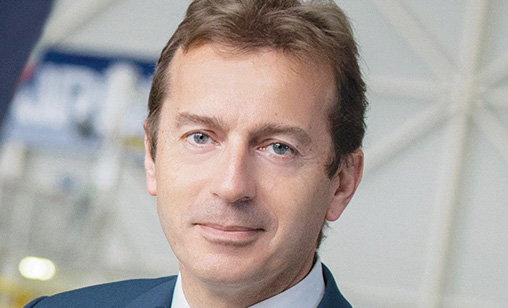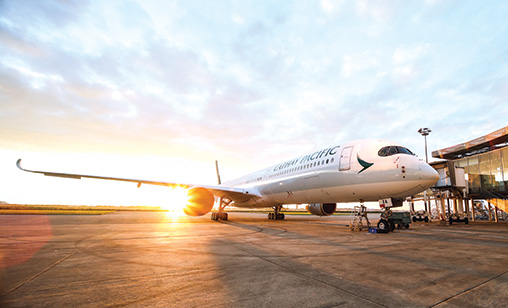News Backgrounder
Plain speaking from Airbus boss Faury
Delivery delays caused by engine faults and orders under threat from geopolitical tensions. Across the Atlantic, rival Boeing is considering a new aircraft that could dent the Toulouse manufacturer’s A321 market. New technology will soon re-draw the factory shop floor. Airbus Commercial Aircraft president, Guillaume Faury, met the press in Sydney to outline his vision for solving some of the OEM’s problems. Chief correspondent, Tom Ballantyne reports.
July 1st 2018
Recently appointed Airbus Commercial Aircraft president, Guillaume Faury, did not make any excuses last month when asked about some 100 A320neo family jets that were sitting in Toulouse waiting for their engines to be attached. Read More »
“Obviously, it is not a good situation for anybody to be in. It is not good for the engine manufacturers, the airplane manufacturers and the customers. We try to communicate with our customers as best we can,” he said.
 |
| 'Comfort on board has improved so much. Therefore the customer acceptance of staying on board is much higher. Taking all those elements into consideration, it is rather likely we will see more and more people willing to go directly to their point of destination. But airlines will have to progressively restructure the way they organize their traffic around the world' |
| Guillaume Faury Airbus Commercial Aircraft presiden |
“It has an impact on costs of management of this complex situation as well as on working capital. The working capital situation of aircraft being produced but not being delivered is creating significant stress on us. I am not giving any indication of how much but this is very, very serious,” he said.
Speaking to media in Sydney in June, Faury (49), the former head of the group’s helicopter division, said Airbus intended to deliver these aircraft to customers by year end.
The delivery issue has developed because one engine supplier to the aircraft type, Pratt & Whitney, has encountered several problems with its Geared Turbofan (GTF) PW1100G engine. A second supplier to the A320neo family, CFM International, has had to delay some deliveries of its new LEAP-1A engine.
Faury also is monitoring separate problems on engines provided to Boeing’s 787s by Rolls-Royce. The UK manufacturer, which announced job cuts of 4,600 staff last month, is the biggest engine supplier to the Airbus wide-body family. There has been no impact on Airbus programs from that source.
Despite an increasing number of “gliders” waiting for their engines, Airbus said it is continuing to build the A320neo in a linear way that will deliver an “unprecedented” number of aircraft to their customers in the second half of the year – as engines arrive. It expected to meet its target of 800 delivered airplanes in 2018.
Pratt & Whitney powered A320neo deliveries were suspended in February and resumed in May after a fix was applied to the engine type. Pratt & Whitney and CFM are “more or less” sticking to recovery plans they presented to Airbus at the beginning of the year, said Faury.
The situation with CFM was “more manageable”, he said with its engine delivery delays running about two months behind. “These are two good engines,” he said. “The current problems have developed for a number of reasons, but I believe, in the mid and long-term, both of them will be very good for customers.”
Ironically, as delays continue, Airbus is considering future delivery rates of 70-75 aircraft a month and is expanding monthly production rates from 50 to 60 aircraft. Faury believed there was an appetite in the market for higher delivery rates, although he indicated there had been a “lukewarm” response to the initiative from engine suppliers, given their present problems.
Going beyond 60, most likely to 63 initially, would not happen until “the beginning of the next decade,” he said. An additional ramp-up would need more automation and a different approach to production. “We do not want to invest into more of the same,” he said. The fourth A320/A320neo Final Assembly Line (FAL), opened in Hamburg last month, was built with more automaton and robots than previous FAL.
Faury has not indulged in warrior rhetoric with Boeing about sales scored or production rate jumps, but he said Airbus was doing its best to disrupt the market for the Seattle manufacturer’s proposed new mid-market aircraft (NMA).
 |
Boeing is considering building the NMA as bridge between its B737 and the B757. No decision on proceeding from concept to approval has been made, Boeing has said.
Airlines known to be interested in the NMA are the Qantas Group, America Airlines, Delta Airlines and United Airlines. In particular, Qantas is calling for a plane that is an alternative offering to the A321LR as it plans medium term replacement of the group’s B737 fleet.
“What I can share with you is we are trying to make their decisions difficult by having the very competitive A321 and the A321 long range, as well as the A330neo that would be complementary with the A321,” Faury said. “We believe the space for the NMA is not that large. It might be one of the reasons Boeing is taking time to make decisions [about it].”
Asked about the trend towards ultra-long-haul flying, Faury said it was premature to predict the growth of the sector. “The A350 especially is creating opportunities given the very long range that it brings to the market, and maybe to a bigger extent than expected a couple of years ago,” he said.
“It has the potential to significantly re-organize routes and point-to-point services. It is still in development. I am not sure we have seen the full potential of these very long-range planes.
“The first ones (airlines) that are starting to play with it will determine if more companies will want to go in that direction. We think we have the right product and the schemes behind the product to keep going in that direction.
“What I can’t tell - you know I joined this business rather recently – and I am certain airlines have more ability (than me) to answer the question, is will passengers be willing to go for routes that are so long?”
Recent geopolitical tensions mean Airbus’s multi-billion dollar order with Iran for new jets is in jeopardy. Airbus’s European built airplanes are equipped with significant U.S. produced components.
“On Iran, we will comply with U.S. rules. It is an unfortunate situation but it’s a political situation,” he said. “Trade wars are not positive for anybody and not positive for aviation in particular. The magnitude of the impact is to be determined and will depend on how it either escalates or goes down.”